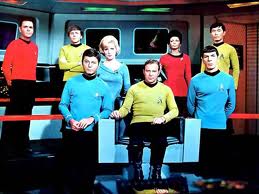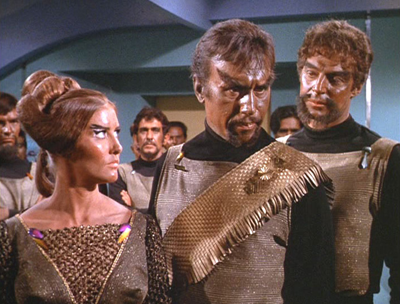The Neomalthusianism of Captain Kirk
Devra Torres | Mar 10, 2014 | 2 cmts
I have a confession to make. I'm a Star Trek fan.

Not the movie versions. I tried to watch one of them once, but it was too much like being imprisoned in an unpleasantly frenzied video game.
Not even The Next Generation, or whatever the remake is called.
I mean the old, old, OLD Star Trek, the version that was already a rerun during my annual childhood visit to my grandparents’ house. (Every year my sister Abby and I spent one week at Nana and Lenny's house, busily making up for the other 51, which were TV-less. This involved a lot of Star Trek.) Now my husband and I watch DVDs of the reruns with my own kids.
So there we were, last night, all cozy in the basement, watching Captain Kirk singlehandedly overcome the self-imposed predicament of a backward civilization.

He’d beamed down to a planet where disease and death were nearly unheard of. Yet all was not well. People kept having babies, but they weren’t sickening and dying at a fast enough rate to make room for the growing population.
They weren’t starving, but the overcrowding was getting really insufferable. There they were, milling around unhappily in the background, ready to kill or die for the unimaginable luxury of a little breathing space, while their leader explained the problem to Captain Kirk.

“But,” Kirk implores, in a tone of deep (if over-acted) concern, "Why haven’t you introduced any of the new techniques to sterilize men and women?…the new devices to safely prevent conception?”
What could be more obvious?
But no. You see (the misguided ruler explains), his people hold life sacred "in every form from fetus to developed being. It is against our tradition, agaisnt our very nature. We simply could not do it."
(Instead, for some reason, he is plotting to introduce a deadly germ to kill off the surplus population. This somehow doesn’t count as violating life’s sacredness, or it’s in the service of it, or something. Count on Star Trek to ask interesting questions, but never, ever count on Star Trek to answer them in a way that bears a little intellectual scrutiny.)
In the end, some solution or other is found, and the race lives happily ever after, at least until next week.
Here’s what struck me, though. Not that Star Trek was being preachy. The baldness of its preachiness, like the cheesiness of its papier-mache rock chambers and ceremonial polyester garb, is part of its peculiar charm (at least for those with eyes to see).

Nor was I even slightly startled to find its preachiness on the side of the zeitgeist of pop culture. That was about as astonishing as a pothole in Michigan.

What did surprise me was how quaint it all sounded. The crisis of overpopulation? Nowadays, even the UN worries about the opposite. Sterilization? Yes, of course it’s still pushed as a panacea, but people are a little squeamish about it, or at least about wholehearted praise of it. It’s “permanent birth control,” pushed by faux-carefree advertisements like this.

And those devices that “harmlessly” suppress fertility? Today, even Vanity Fair, taking a page from Live Action’s playbook,

goes undercover to catch Planned Parenthood telling young girls that Nuvaring is safe for just about everyone who’s not having a heart attack at the moment she's using it. Even Ricki Lake has an upcoming documentary on a 'feminist critique" of birth control: Sweetening the Pill, And New York Magazine had a recent article along the same lines.

I’m not sanguine about where our culture is going on this. I can see that the antinatalist mindset is alive, well, and lavishly financed. But in some ways it’s less naïve, less optimistic, less bald and blatant.
Better living through chemistry doesn’t sound as convincing, or even as appealing, as it did in the days of the Starship Enterprise.

Comments (2)
Katie van Schaijik
Mar 17, 2014 11:12am
I'm confident that this will happen regarding same-sex marriage someday too. Someday in the not too distant future, the wider culture will begin to get squeamish about it. The widely popular public imagination prevailing right now that it's "the same love" and an unambiguous civil rights issue won't hold.
But how much terrible damage will be done between now and then!
Devra Torres
Mar 17, 2014 2:32pm
You see the same kind of thing with the issue of divorce: the movement from sanguine 70's-stryle assumptions that the freedom to divorce for whatever reason would lead to more happiness for just about everybody. With all the data, and especially all the personal experience, about the unhappiness and poverty that has come of the no-fault mentality, people don't talk that way anymore. But it hasn't played itself out--now we've shifted to reluctance to get married in the first place, or a radical uncertainty about what we even want to call marriage.